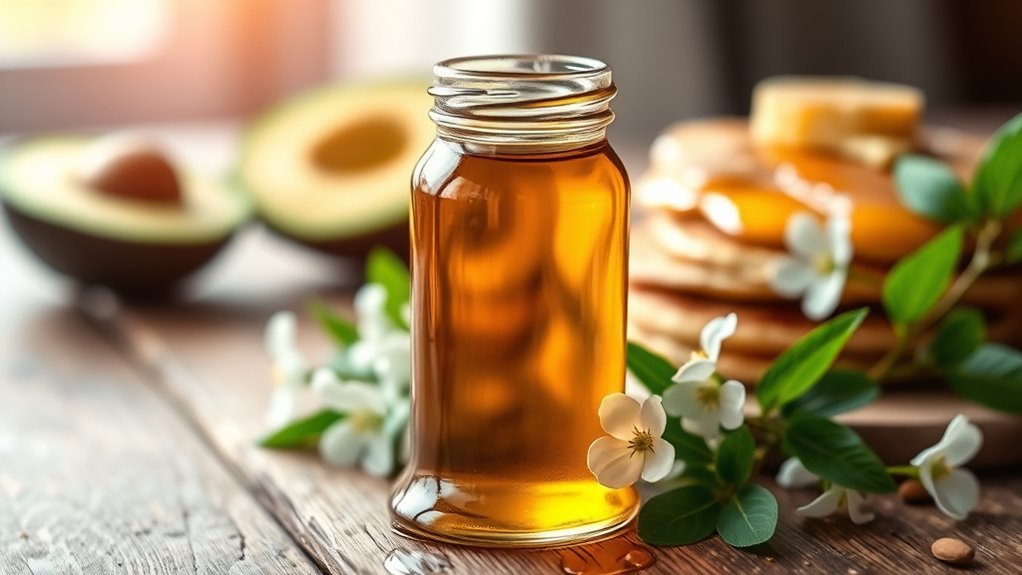Maple syrup isn’t keto-friendly due to its high carbohydrate content, containing about 13 grams of carbs per tablespoon. This can quickly exceed your daily carb allowance on a ketogenic diet, disrupting ketosis. While it does have some health benefits, like being rich in antioxidants and minerals, the sugars can negatively impact blood sugar levels. If you’re looking for lower-carb alternatives to satisfy your sweet tooth, there are better options available that won’t derail your keto goals.
Understanding the Keto Diet and Its Requirements

When you’re exploring the keto diet, it’s essential to understand its core principles and requirements. The keto diet primarily focuses on drastically reducing carbohydrate intake while increasing fat consumption. This shift encourages your body to enter a state of ketosis, where it burns fat for energy instead of carbohydrates. To achieve this, you’ll need to adhere to specific macronutrient ratios: typically around 70-75% fats, 20-25% proteins, and only 5-10% carbohydrates. By understanding these keto diet principles, you’ll empower yourself to make informed choices about food. Remember, it’s not just about cutting carbs; it’s about finding the right balance that allows for a sustainable and enjoyable lifestyle while reaping the potential benefits of the ketogenic approach.
Nutritional Profile of Maple Syrup

Although maple syrup is often celebrated for its rich flavor and natural sweetness, understanding its nutritional profile is vital, especially for those following a keto diet. A typical serving of maple syrup contains about 52 calories, 13.4 grams of carbohydrates, and minimal protein and fat. The nutrient breakdown reveals that it’s high in sugars, primarily sucrose, which can quickly elevate blood sugar levels. While it does offer small amounts of minerals like manganese and zinc, these benefits may not outweigh its carbohydrate content for keto dieters. If you’re seeking alternatives that align better with your dietary goals, considering the overall impact of maple syrup on your daily carb intake is important for maintaining ketosis.
Carb Content Comparison: Maple Syrup vs. Keto Alternatives

When considering whether maple syrup fits into a keto diet, it’s essential to compare its carb content with that of low-carb sweetener alternatives. Maple syrup contains a significant amount of carbohydrates, which can impact ketosis. Exploring options like erythritol or stevia can help you find suitable replacements that align better with your dietary goals.
Nutritional Profile Overview
Maple syrup, often celebrated for its rich flavor, contains a significant amount of carbohydrates, making it a less-than-ideal choice for those following a ketogenic diet. A typical serving of maple syrup provides around 13 grams of carbs, which can quickly exceed your daily carb allowance on keto. While it does offer some nutritional benefits, such as antioxidants and minerals, its high glycemic index can lead to spikes in blood sugar levels, contradicting keto principles. In contrast, keto-friendly alternatives usually contain minimal carbs and lower glycemic indices, allowing for better blood sugar control. If you’re seeking freedom in your dietary choices, it’s crucial to weigh these factors carefully when considering maple syrup versus low-carb options.
Low-Carb Sweetener Options
While many people enjoy the taste of maple syrup, it’s important to contemplate low-carb sweetener options that align better with a ketogenic diet. Maple syrup contains about 13.4 grams of carbs per tablespoon, which can quickly add up in low carb desserts. Instead, consider alternatives like erythritol, stevia, or monk fruit, which have negligible carbs and can provide that sweet flavor you crave. When using these sweeteners, be mindful of sweetener ratios, as they can vary considerably. For instance, erythritol is often used in a 1:1 ratio with sugar, while stevia is much sweeter, requiring less. By choosing the right low-carb sweetener, you can enjoy your desserts without compromising your keto goals.
Potential Health Benefits of Maple Syrup
Although many people consider maple syrup primarily a sweetener, it also offers several potential health benefits that are worth exploring. Rich in antioxidants, maple syrup contains compounds like phenolic acids that may help combat oxidative stress and inflammation in your body. Additionally, it provides essential minerals such as manganese, zinc, and calcium, which support various bodily functions, including immune health and bone strength. Maple syrup also has a lower glycemic index compared to refined sugars, which means it may have a gentler impact on your blood sugar levels when consumed in moderation. By choosing maple syrup as a sweetener, you can enjoy its unique flavor while potentially reaping these health benefits. Just remember, moderation is key!
Keto-Friendly Substitutes for Maple Syrup
If you’re looking for keto-friendly alternatives to maple syrup, there are several options to contemplate. Sugar-free maple syrup offers a similar flavor without the carbs, while coconut aminos can provide a unique, savory twist. Additionally, erythritol-based sweeteners can satisfy your sweet tooth without impacting your ketosis.
Sugar-Free Maple Syrup
When you’re following a keto diet, finding alternatives to traditional maple syrup can be challenging due to its high sugar content. Fortunately, sugar-free maple syrup options are available, allowing you to enjoy that sweet flavor without the carbs. Popular sugar alternatives like erythritol, monk fruit, and stevia are commonly used in these syrups.
When conducting a taste comparison, many sugar-free brands aim to replicate the rich, sweet profile of real maple syrup, and some even succeed remarkably well. However, individual preferences vary, so you might want to sample a few types to find the one that suits your palate best. Embracing sugar-free alternatives can help maintain your keto lifestyle while satisfying your cravings for sweetness.
Coconut Aminos Alternatives
While maple syrup is often a go-to sweetener in many recipes, those on a keto diet might find themselves searching for alternatives like coconut aminos. This soy sauce substitute is low in carbs and offers unique coconut aminos benefits, including a savory flavor that can enhance your dishes. You can use it in salad dressings, marinades, or even as a dipping sauce, providing a versatile option when you want to avoid traditional sweeteners.
For coconut aminos recipes, consider using it to glaze roasted vegetables or in stir-fries for a touch of sweetness without the carbs. It’s an excellent way to maintain flavor while adhering to your keto lifestyle, making it a smart choice for your pantry.
Erythritol-Based Sweeteners
Coconut aminos can be a great alternative, but if you’re looking for something even closer to maple syrup in flavor and consistency, erythritol-based sweeteners are worth considering. Erythritol offers several benefits, including zero calories and a low glycemic index, making it a popular choice for those following a keto diet. It can mimic the sweetness of maple syrup without the carbs. However, there are some erythritol drawbacks to keep in mind. Some people may experience digestive discomfort when consuming it in large amounts, and it doesn’t caramelize like sugar, which might affect certain recipes. Overall, erythritol can be a viable keto-friendly substitute for maple syrup, allowing you to enjoy sweet flavors while maintaining your dietary goals.
Tips for Using Maple Syrup in Moderation
Although maple syrup can add a delightful flavor to your dishes, it’s important to use it sparingly, especially on a keto diet. Here are some maple moderation tips to help you maintain a sweetener balance:
- Measure Your Portions: Use a teaspoon instead of pouring directly from the bottle to control how much you’re using.
- Combine with Other Sweeteners: Mix maple syrup with low-carb sweeteners to reduce overall sugar intake while still enjoying the flavor.
- Limit Serving Frequency: Reserve maple syrup for special occasions rather than everyday use to keep your carbohydrate count in check.
- Pair Wisely: Use it in recipes where the flavor can shine, minimizing the amount needed for balance.
Recipes Incorporating Maple Syrup Alternatives
If you’re looking to enjoy sweet flavors without the carbs associated with maple syrup, there are plenty of delicious alternatives to contemplate. You can use sugar-free maple syrup substitutes like erythritol or monk fruit sweetener in your favorite keto-friendly recipes. For a delightful breakfast, try drizzling these substitutes over pancakes made with almond flour or coconut flour. You can also sweeten your morning coffee or tea with a few drops of these alternatives, keeping your drink satisfying yet low in carbs. Another option is using a sugar-free syrup in marinades for grilled meats or roasted vegetables. These options not only maintain flavor but also fit seamlessly into your keto lifestyle, allowing for creativity in the kitchen.
Final Thoughts on Maple Syrup and Keto Living
While sugar-free alternatives can help satisfy your sweet tooth on a keto diet, it’s important to contemplate the role of traditional maple syrup. If you’re considering incorporating it into your keto lifestyle, keep these points in mind:
- Carbohydrate Content: Maple syrup contains a high amount of carbohydrates, which can disrupt ketosis.
- Quality Matters: Opt for pure maple syrup; it has more nutrients than processed options.
- Moderation is Key: If you choose to indulge, do so in small amounts to minimize carbohydrate intake.
- Balance Your Diet: Focus on overall nutrition; one ingredient shouldn’t derail your keto journey.
Ultimately, understanding maple syrup’s impact can guide your choices, allowing you to enjoy life while staying aligned with your keto goals.
Frequently Asked Questions about Maple Syrup and Keto
1. Is maple syrup keto-friendly?
Maple syrup is not considered keto-friendly due to its high carbohydrate content. A single tablespoon of pure maple syrup contains approximately 13.4 grams of carbs, which can significantly impact your daily carb limit if you are following a strict ketogenic diet. For those adhering to a keto lifestyle, it’s advisable to opt for low-carb sweeteners instead.
2. What are the alternatives to maple syrup for a keto diet?
There are several keto-friendly alternatives to maple syrup that can be used for sweetening. Some popular options include stevia, erythritol, monk fruit sweetener, and allulose. These substitutes provide sweetness without the high carb content, making them more suitable for a ketogenic diet.
3. Can I use maple syrup in moderation on a keto diet?
While it’s technically possible to use maple syrup in moderation on a keto diet, it can be challenging to stay within the typical daily carb limits (20-50 grams) without exceeding them. If you choose to incorporate maple syrup, it’s essential to measure your portions carefully and account for all carbohydrates consumed throughout the day.
4. What are the health benefits of maple syrup compared to artificial sweeteners?
Maple syrup contains antioxidants and minerals like manganese and zinc, which can offer some health benefits compared to artificial sweeteners. However, the high sugar content makes it less favorable for those on a keto diet. If you are looking for a sweetener that provides some nutritional benefits, consider using maple syrup occasionally, but prioritize low-carb options for everyday use.
5. How does maple syrup affect ketosis?
Consuming maple syrup can disrupt ketosis due to its high sugar content, which increases blood glucose levels. This can lead your body to shift away from burning fat for fuel, which is the primary goal of a ketogenic diet. To maintain ketosis, it’s best to avoid or minimize the consumption of high-carb foods like maple syrup.
References
- https://www.healthline.com/nutrition/keto-friendly-sweeteners
- https://www.ncbi.nlm.nih.gov/pmc/articles/PMC6467974/
- https://www.webmd.com/diet/what-is-the-keto-diet
- https://www.mayoclinic.org/healthy-lifestyle/nutrition-and-healthy-eating/expert-answers/keto-diet/faq-20488110
- https://www.journalofnutrition.org/content/149/6/1009S
- https://www.verywellfit.com/keto-diet-explained-5192393
- https://www.foodnetwork.com/healthy-eating/keto-diet-faq-what-to-know-4807080


